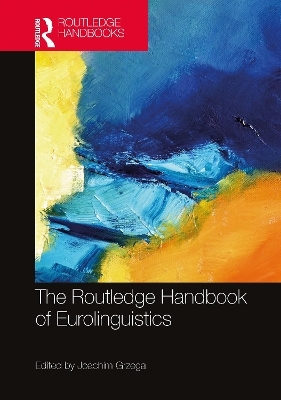
The Routledge Handbook of Eurolinguistics
Routledge (Verlag)
978-1-032-64765-4 (ISBN)
- Noch nicht erschienen (ca. März 2025)
- Versandkostenfrei innerhalb Deutschlands
- Auch auf Rechnung
- Verfügbarkeit in der Filiale vor Ort prüfen
- Artikel merken
Featuring 30 chapters written by leading experts of European languages and linguistics, this book:
• Illustrates the major theoretical and methodological developments and institutionalizations of the field
• Presents typical features for the various linguistic levels of European languages (standard and non-standard)—formally and semantically
• Analyses aspects of writing, phonological aspects, grammatical aspects, lexical aspects, language use, multimodal aspects, including contributions on body language and sign languages
• Investigates typical commonalities with respect to various historical and current social issues with chapters on traditions of translation, multilingual settings in Europe, teaching foreign languages, and language policies
The Routledge Handbook of Eurolinguistics is essential reading for those with an interest in European languages and linguistics, language contact and change, and language typology.
Joachim Grzega is Associate Professor for Linguistics at the University of Eichstätt-Ingolstadt (Germany) and head of the project unit “Innovative European Sprachlehre (InES)” at Volkshochschule Donauwörth (Germany). He was also director of Europäisches Haus Pappenheim (Germany), the first institution to combine Eurolinguistic research with offers for a broad public. He has authored over 200 publications, has organized several international Eurolinguistics conferences, and edits the Journal for EuroLinguistiX.
List of Figures and Tables
Preface and Acknowledgements
List of Contributors
Part I
Introduction
1
Basic Definitions of Eurolinguistics
Joachim Grzega
2
Major Developments and Perspectives of Eurolinguistics
Joachim Grzega and Uwe Hinrichs
Part II
Aspects of Language Systems
3
Eurowriting (I): The World of Writing in Antiquity
Harald Haarmann
4
Eurowriting (II): Developments beyond Antiquity
Harald Haarmann
5
Phonological Europeanisms
Pavel Iosad and Dmitry Nikolaev
6
Morphosyntactic Europeanisms
Rolf Thieroff
7
Commonalities of Non-Standard Varieties in Europe
Adriano Murelli
8
Genealogy, Linguistic Distance and Mutual Intelligibility in European Languages
Vincent J. van Heuven, Wilbert Heeringa and Charlotte Gooskens
9
Lexical Europeanisms
Harald Haarmann and Joachim Grzega
10
Semantic Europeanisms
Adam Głaz and Stanisława Niebrzegowska-Bartmińska
11
Onomasiological Europeanisms
Joachim Grzega
12
European Eponyms
Joachim Grzega and Wolfgang Pöckl
13
Phraseological Europeanisms
Carmen Mellado Blanco
Part III
Aspects of Language in Use and Multimodal Aspects
14
European Commonalities in Addressing Behaviour—Present and Past
Joachim Grzega
15
Europeanisms among Speech Acts: Focus on Requests
Claudia Stoian
16
Discourses in Europe: Commonalities and Differences
Hans W. Giessen and Iwona Szwed
17
European Aspects of the Body in Language and Communication
Jana Bressem
18
A Cross-Linguistic Look at European Signed Languages: Focus on Stance-Taking
Fien Andries and Myriam Vermeerbergen
19
European Commonalities of Relations between Voice and Emotion
Annebeth Demaeght, Josef Nerb and Andrea Müller
Part IV
Language and Societal Issues in European Nations
20
Commonalities among Language Policies in Europe—Past and Present
Rosa Calafat and Laia Darder
21
Linguistic Pluricentricity in European Standard Language Cultures
Josep Àngel Mas Castells and Carla Amorós-Negre
22
Commonalities of (Post-)Colonial Varieties of European Languages (Dutch, English, French, Portuguese, Spanish)
Bettina Migge, Hugo Cardoso, Joseph Farquharson, Philipp Krämer and Eeva Sippola
23
Practice of Subjective Metalinguistic Reflection in European Comparison
Katharina Jacob and Ekkehard Felder
24
Aspects of Linguistic Landscapes in Europe
Katharina Tyran
25
European Commonalities in Linguistic Integration Policies
Coraline Pradeau
26
European Commonalities of Translation Strategies—A Diachronic Sketch
Jörn Albrecht, Irene Kunert and Joachim Grzega
27
Language Policies of the European Union and the Role of Translating (and Interpreting) for Communication
Karin Luttermann and Jan Engberg
28
European Commonalities in Teaching and Learning Languages: Focus on Multi- and Plurilingualism
Claudia Polzin-Haumann and Christina Reissner
29
European Planned Auxiliary Languages
Ida Stria
30
Lingua Francas in the European Context—Past, Present, and Future
Harald Haarmann and Joachim Grzega
Index
| Erscheint lt. Verlag | 31.3.2025 |
|---|---|
| Reihe/Serie | Routledge Handbooks in Linguistics |
| Zusatzinfo | 7 Tables, black and white; 13 Line drawings, black and white; 8 Halftones, black and white; 21 Illustrations, black and white |
| Verlagsort | London |
| Sprache | englisch |
| Maße | 174 x 246 mm |
| Themenwelt | Schulbuch / Wörterbuch ► Wörterbuch / Fremdsprachen |
| Geisteswissenschaften ► Sprach- / Literaturwissenschaft ► Sprachwissenschaft | |
| ISBN-10 | 1-032-64765-5 / 1032647655 |
| ISBN-13 | 978-1-032-64765-4 / 9781032647654 |
| Zustand | Neuware |
| Informationen gemäß Produktsicherheitsverordnung (GPSR) | |
| Haben Sie eine Frage zum Produkt? |
aus dem Bereich


